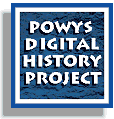
Church and chapel 2
Ripe for the Gospel
Familiarity with the bible
The spread of new church and dissenting schools meant
that many of the poorest households had one literate family member
who could read the Bible and other works to assembled family
and friends, and the resultant familiarity with the bible and
awareness of new religious ideas meant that Wales did indeed
become, as John Wesley claimed, ‘ripe for the Gospel’.
The Church of England clergy in Wales in the first half of the eighteenth century was a clergy divided by wealth and culture. The bishops were often English or Scottish, with a reluctance to visit their dioceses and an antipathy or indifference to the Welsh language. They tended to appoint like-minded clergy to the more affluent livings, who would then turn over the running of the parish to poverty- stricken clergy who could not carry out their duties effectively. This also affected the poorer mountain livings where clergy struggled to make ends meet.
Uncaring clergy
Many of the clergy appointed by the bishops were not Welsh speakers.
This caused much resentment in north Wales, and there grew across
Wales a general feeling that many Church of England clergy were
uncaring of the needs of their parishioners. The discontented
and newly-literate Welsh rural population became exposed to the
force of three dynamic personalities which were the engine of
revivalism in Wales. These were William Williams, Daniel Rowland
and Howell Harris of Trefecca in Breconshire. All three saw themselves
as a part of the traditions of the established church, but sought
to energise the church and directly involve individual parishioners
in an awareness of the gospel message.
There are 8 pages in this sequence. Use the box links below to view the other pages.